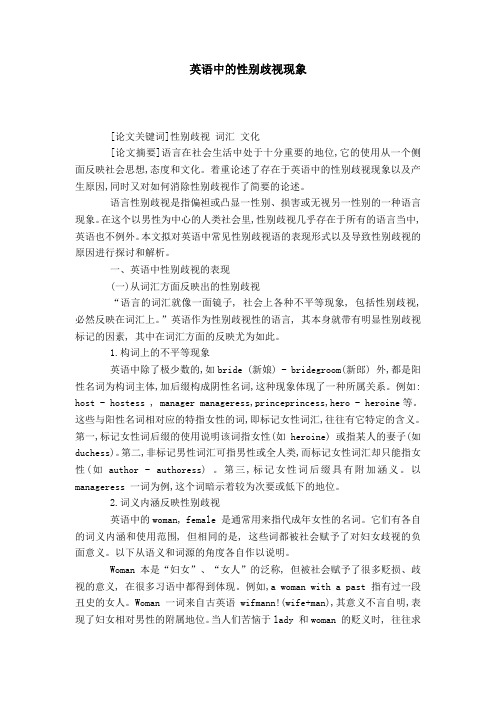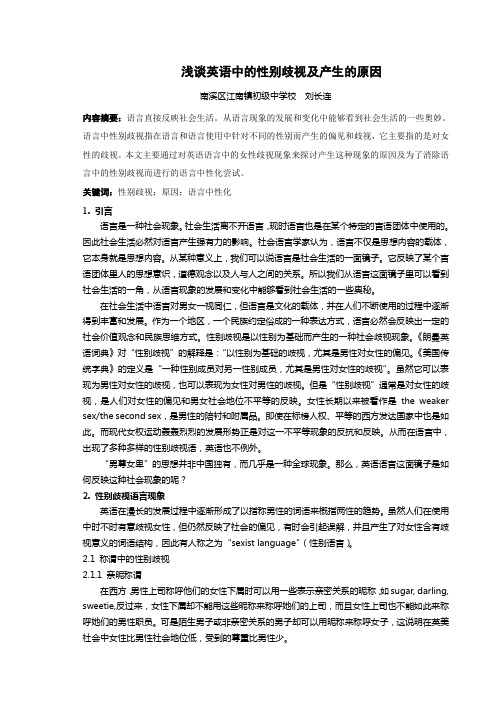《英语中的性别歧视》参考文献
英语中的性别歧视

湖南大学硕士学位论文英语中的性别歧视姓名:***申请学位级别:硕士专业:外国语言学及应用语言学指导教师:***2001.5.1娶囊398五08英语中的性别歧视中文摘要性别歧视一性别语言研究的一个方面,是在揭示了语言的不对称现象以后提出的,其理论依据是Sapir-Whorf假说.本文运用比较、统计等方法,对收集的言语材料进行科学的分类和汇总,通过归纳和演绎,把描写和解释相结合,在前人研究成果的基础上,以语言学的相关理论为主线,从语言与社会、语言与文化等角度,分析性别歧视出现、发展和变化的社会、文化以及心理因素;运用语义学、词汇学和语法学等理论和方法,对性别歧视现象作历时和共时的研究,阐述了性别歧视的语义、词汇和句法与构词法特征,并对性别歧视的发展趋势进行了探讨与展望.在论述的过程中,通过大量实例剖析来阐述观点,使论证具有较强的科学性和严密的逻辑性.关蹙词:毒王武文化,语言,性则歧视,&p蚺w蛔盯饭说,、’’sexisminEnglishYAbstractSexism,astudyonthegender/sexoflanguage,hasbeencarriedonafterthediscoveryoflinguisticasymmetry,theoreticallybasedonSapir-Whorfhypothesis.Thethesis,endebtedalottopreviousresearch,isapersonalstudyontheexposition,developmentandchangeofsexism,suchasthesocial,culturalandpsychologicalreasons,accordingtotherelevanttheoryoflinguisticsfromtheanglesoflanguage&society,language&culture,etc.Methodssuchascomparison,statistics,induction&deduction,description&explanation,synchronicanddiachronicapproachesareemployedtoobtaintheresults.Thesemantic,lexical,andsyntacticalfeaturesofsexismaleshowninthispaper,andthefutureofsexismisalsopredicted.Throughoutthisthesis,alargenumberofconcreteandillustrativeexamplesareincludedtoshowtheviewpointsmorescientificallyandlogicallylKeywords:society,culture,language,gex&gender,sexism.Sapir-Whorfhypothesis■‘t0SummaryChapterIGeneralReflectionontheStudyTheintroductorychaptergivesanoverviewofthestudyofsociolinguistics,especiallythestudyofmale/femalelanguage,andwhattheauthorhasdone,developingfoursectionsasfollows:1.1SubjectsandapproachesAmajortopicinsociolinguisticsistheconnectionbetweenstructures,vocabulariesandwaysofusingparticularlanguagesandthesocialrolesofmenandwomen.Sincethemid·1970sresearchOnlanguageandsexhasbeenconcentratedOUtherolelanguageplaysinthelocationandmaintenanceofwomeninadisadvantageouspositioninsociety.Insociolinguistievariations,sexisinvestigatedasanindependentvariablerelatedtolinguisticvariables,alongwithsocialstatus,ageandethnicity.Theauthorintroducesthesubjects(1anguagefeaturesofsexisminEnglish)tobestudied,andmethodsandtechniquesemployedinthestudy.ItisalsopointedoutthatthebestwayofstIldyistoseefromtheangleofculturallinguistics。
英语中的性别歧视现象-模板

英语中的性别歧视现象[论文关键词]性别歧视词汇文化[论文摘要]语言在社会生活中处于十分重要的地位,它的使用从一个侧面反映社会思想,态度和文化。
着重论述了存在于英语中的性别歧视现象以及产生原因,同时又对如何消除性别歧视作了简要的论述。
语言性别歧视是指偏袒或凸显一性别、损害或无视另一性别的一种语言现象。
在这个以男性为中心的人类社会里,性别歧视几乎存在于所有的语言当中,英语也不例外。
本文拟对英语中常见性别歧视语的表现形式以及导致性别歧视的原因进行探讨和解析。
一、英语中性别歧视的表现(一)从词汇方面反映出的性别歧视“语言的词汇就像一面镜子, 社会上各种不平等现象, 包括性别歧视, 必然反映在词汇上。
”英语作为性别歧视性的语言, 其本身就带有明显性别歧视标记的因素, 其中在词汇方面的反映尤为如此。
1.构词上的不平等现象英语中除了极少数的,如bride (新娘) - bridegroom(新郎) 外,都是阳性名词为构词主体,加后缀构成阴性名词,这种现象体现了一种所属关系。
例如: host - hostess , manager manageress,princeprincess,hero - heroine等。
这些与阳性名词相对应的特指女性的词,即标记女性词汇,往往有它特定的含义。
第一,标记女性词后缀的使用说明该词指女性(如heroine) 或指某人的妻子(如duchess)。
第二,非标记男性词汇可指男性或全人类,而标记女性词汇却只能指女性(如author - authoress) 。
第三,标记女性词后缀具有附加涵义。
以manageress 一词为例,这个词暗示着较为次要或低下的地位。
2.词义内涵反映性别歧视英语中的woman, female 是通常用来指代成年女性的名词。
它们有各自的词义内涵和使用范围, 但相同的是, 这些词都被社会赋予了对妇女歧视的负面意义。
以下从语义和词源的角度各自作以说明。
Woman 本是“妇女”、“女人”的泛称, 但被社会赋予了很多贬损、歧视的意义, 在很多习语中都得到体现。
英语中的性别歧视及产生的原因(1)(DOC)

浅谈英语中的性别歧视及产生的原因南溪区江南镇初级中学校刘长连内容摘要:语言直接反映社会生活。
从语言现象的发展和变化中能够看到社会生活的一些奥妙。
语言中性别歧视指在语言和语言使用中针对不同的性别而产生的偏见和歧视,它主要指的是对女性的歧视。
本文主要通过对英语语言中的女性歧视现象来探讨产生这种现象的原因及为了消除语言中的性别歧视而进行的语言中性化尝试。
关键词:性别歧视;原因;语言中性化1. 引言语言是一种社会现象。
社会生活离不开语言,现时语言也是在某个特定的言语团体中使用的。
因此社会生活必然对语言产生强有力的影响。
社会语言学家认为,语言不仅是思想内容的载体,它本身就是思想内容。
从某种意义上,我们可以说语言是社会生活的一面镜子。
它反映了某个言语团体里人的思想意识,道德观念以及人与人之间的关系。
所以我们从语言这面镜子里可以看到社会生活的一角,从语言现象的发展和变化中能够看到社会生活的一些奥秘。
在社会生活中语言对男女一视同仁,但语言是文化的载体,并在人们不断使用的过程中逐渐得到丰富和发展。
作为一个地区,一个民族约定俗成的一种表达方式,语言必然会反映出一定的社会价值观念和民族思维方式。
性别歧视是以性别为基础而产生的一种社会歧视现象。
《朗曼英语词典》对“性别歧视”的解释是:“以性别为基础的歧视,尤其是男性对女性的偏见。
《美国传统字典》的定义是“一种性别成员对另一性别成员,尤其是男性对女性的歧视”。
虽然它可以表现为男性对女性的歧视,也可以表现为女性对男性的歧视。
但是“性别歧视”通常是对女性的歧视,是人们对女性的偏见和男女社会地位不平等的反映。
女性长期以来被看作是the weaker sex/the second sex,是男性的陪衬和附属品。
即使在标榜人权、平等的西方发达国家中也是如此。
而现代女权运动轰轰烈烈的发展形势正是对这一不平等现象的反抗和反映。
从而在语言中,出现了多种多样的性别歧视语,英语也不例外。
“男尊女卑”的思想并非中国独有,而几乎是一种全球现象。
浅析英语中的性别歧视

的 从最
“ De a r S i r o r Ma d a m” “ ma n a n d wo ma n ”
言
性别歧 视( S e x D i s c r i m i n a t i 0 n . 或S e x i s m) 指一种性别成员对另一种性别成员的不平等 对待 在人类 的发展历程上主要表现为男性 对女性的歧 视 .这种歧视尤其是在生产力并 不发达 的原始社 会和封建社 会时尤 为突 出 随着 社会 的进 步和 工业 文 明的 阳光普 照大 地 .越来越 多的社会成员意识到男女平 等这 普世的价值观念 . 因此 . 近代各 国宪法 中也 纷纷 将男 女平 等作 为平 等权 的重 要组 成部 分 例如 . 美国1 9 7 2年国会通过的关于男女 权利平等 的第 2 7条宪法修正案.在得到 3 / 4 的多数州议 会批准后.也成 为美国宪法 的一 部分 .从而以国家根本大法的形式上消除 了 性别歧视 然而宪法 只是对性别歧视 问题仅 仅做 了原则性 的规定 .社会观念 上如何 认可 这一价值 才是根 本 . 例如 2 O 世纪7 O 年代初 . 在英国出版的 B r i t a n n i c a i u n i o r e n c y c l o p e d i a 把 me n解释 为 t h e h i g h e s t f o r m o fl i f e O f e a r t h 认 为 Ma n mu s t i n v e n t mo s t o f h i s b e h a v i o r . 可 以看 出.用 m e n来 代替所 有 的人 .故 意使 w o m a n一词不 出现 因此 . 作为社会反 映的 语言文化部分 中依然随处 可见的性 别歧视急
一 .
浅谈英语语言中的性别歧视

刘
� 摘 要 语 言是 文化 的一 部分 , 并对 文化 起着 重要 的作 用 有些 社会 学家 认
洁
法从 一个 侧面 反映 出旧 社会 中地 位较 高的 职业 为男 子 所垄 断, 相反 地
咸宁职业技术学院外语系 湖北省 咸宁市 � � � � � �
为 � , 没有 语言 就没 有文 化 另 一方 面, 语言 又受 文化 的影 响, 反 应文 化特 征 性 别 � � � � � � � � � � � � � � � � � � � , , 等 人们 一般 认为 是 女性 , 如为 男 性时 前 面要 加 歧视 的现 象作 为 一个 历史 久 远的 社会 问 题, 几 乎存 在 于每 个 语 言中 , 并 反映 了 在 � � � � � � � � � � � � � � � � � 上 或是 , 如: 这 些习 惯除 了历 史现 实情 况有 关, 也可 � 男性 统治 下的 社会 中, 女性 对男 性的 依赖 性, 以 及女 性所 受的 歧视 英 语这 门语 言 也不 例外 ,英 语语 言中 的性 别歧 视十 分普 遍 本文 介绍 了英 语中 的性 别歧 视语 的 � � � 三 谚语 习 语运 用 种种 表现 形式, 分 析这 种现 象产 生的 社会 原因 和文 化根 源, 并 总结 了在 英 语语 言
义的 色彩 � � � � � � � � � � � � � � � � � � � � � � � � � � � � � � � � � � � 心胸 变 化 异 常 )W , .( 女子, 4 )词 语发 展 首先 ,表 面上 对 应的 词,含义 却往 往 褒男 贬 女 在英 语 风向 与命 运,翻 天覆 地无 常态 ) 中往 往通 过对 女性 名词 的恶 化来 达到 性别 歧视 的目 的 性名 词都 带有 贬义, 如 几乎 所 有的 女 也有 少数 谚语 反映 了女 性的 重要 性, 但 此 类谚 语都 局 限于 女性 对 等, 其贬义 为 "雌猫 ", ,� , 家庭 ,丈夫 和孩 子的 责任 与义 务 着重 于女 性的 传 统角 色定 位 ,这正 是 "情 妇 ",以 及 "鸨 母 "等 , 而 与 之 对 应的 � ,� , , 等 词, 如 从另 一个 侧面 影射 了女 性的 附属 地位 如
社会心理语言学视角下英语语言中的性别歧视

文化长廊社会心理语言学视角下英语语言中的性别歧视姜俊楠 哈尔滨师范大学摘 要:“英语是一种有性别的语言。
”在英语国家中,性别歧视俨然已成为一种社会现象。
本文主要从社会心理语言学的视角,分析在英语语言中存在的性别歧视,以及其产生原因、存在及表现形式和发展趋势与其产生的影响。
关键词:社会心理语言学;性别歧视;英语[中图分类号]:H31 [文献标识码]:A[文章编号]:1002-2139(2019)-26-177-01一、引言随着现代社会的迅速发展,女性的社会地位逐渐提高,与社会和男性对女性的刻板印象发生冲突,使女性在日常生活交流中更明显的感知到性别歧视,即语言对女性的歧视。
丹麦语言学家叶斯柏森,他在1923年出版的《英语的发展与结构》一书中曾指出:“英语是他所熟悉的所有语言中最男性化的语言”。
性别歧视也是社会心理语言学的研究内容之一。
“社会心理语言学(Socio-psycholinguistics)”是一门新兴的边缘学科,是酝酿中的语言学第二代分支学科。
本文拟从社会心理语言学的视角下对英语语言中的性别歧视的起因,存在及表现形式,发展趋势及影响进行研究与探讨。
二、英语语言中性别歧视的起因1. 历史文化因素语言和文化的关系就像双胞胎,共同形成,共同成长,他们之间相互依赖也相互影响。
而历史也存在于语言当中,语言随着各个社会历史进程发生改变。
在英语国家中,从进入父系社会开始,女性开始变成“附属品”,男性成为中心,女性承担生儿育女和家务的责任,甚至被买卖奴役。
在西方宗教历史中,基督教教义与犹太教教义中的第一个女人是夏娃。
根据《圣经•旧约》记载,夏娃是由亚当身上的一根肋骨创造出来的。
两人被上帝逐出伊甸园的原因是夏娃受“蛇”的诱惑偷食了禁果,所以基督教神学家认为偷食禁果是夏娃犯下的原罪,也是其它一切 罪恶的开端。
2. 社会因素这种属于社会偏见的性别歧视,是社会化过程中通过社会群体、父母、亲友、伙伴的言传身教和大众传播媒介(广播、电影、电视、网络)获得的。
英语语言中的性别歧视

Sex Discrimination In EnglishAbstractSex discrimination exists in every corner of the world. As a common social phenomenon, it is obviously reflected in English language. This paper mainly discuss the sex discrimination in English, analyses the social and historical causes of such phenonmemon and advise some brief solutions to face the sex discrimination in English speaking.Key words:English; sex discrimination; causes; solutionsIntroduction :In social life, as we all know ,the rights of men and women are supposed to be equal. But there are still various sex discrimination in society.of course, language,as a carrier of culture , is bound to reflect certain social values and ways of thinking.Gender discrimination is a social phenomenon based on sex difference, especially male prejudice against women.Here are some typical sex discrimination in English language.BodyAs for the word form, English words is quite different in different genders. Male is not used with profix in forms of words (except for a very few), while female is used in various form of words. Famale are frequently rewarded as the second sex or the appendage of male.For example: host, god, hero, bride, widow and other wordsrepresent male do not have any postfix,but hostess, goddess, heroine, widower, the words in the original basis of a-ness or-ine,-groom ,-er have such female postfix. Women are seen as a burden. From this perspective,word forms in English indeed reflects discrimination against female.Futhermore,while we expressed in some of the higher occupational status of terms, there is no such a prefix with male words.On the contrast,Female words are often carried with prefix,such as lady-, woman-, female- and so on.Ridiculously,high status occupations are seem inherently owned by men, there is only a minimal part of this occupation are female.But when it comes to lower occupations, they seems exclusively bound to female,such as nurse,secretary.While those occupations taken by male,they are added some prefix to the words,like man,male-and so on.Above all,These iconic occupational words,definitely reflect the discrimination against female.What’s more?As for order of the word,When a number of English words is expressed at the same time,Famel is always behind of the male.For example, father and mother, brother and sister,king and queen.Female will always be inferior to men, follow after the male. We rarely hear the mother and father, sister and brother or queen and king.Unfortunately,the order of the words also reflects the discrimination against women.But how comes those sex discriminations?why does female is so weak in English language?Here are two main causes of sex discrimination in language.First of all, in the Western cultural tradition, male has been considered rich in creativity. In "Bible", God created the first man Adam, being male.Afterwards, God created Adam's wife Eve.Eve is just one of Adam's ribs derived substance.In this view, since God made the first man Adam in this world, the language of its"sex" should be in the first position.As a historical result,female gradually lost its equal position in language.Besides,the root causes of gender discrimination contribute to gender roles played by men and women.Man gradually dominate more in agricultural production activities, while women are trapped in house,to give a birth of baby or do housework.In the long patriarchal society,women has low social position. They are subject to men.This concept gradually rewarded as common sense.Male even publish law to make woman more submissive.As a social result,female become more vulnerable position in language.So how can we avoid those sex discrimination in real life?Here are some brief advice.e non-sexist words instead of discriminational words,such as immigrant, coach, church member, grandparent, employee, patriot, ccivilian, politician, tutor, etc.e more second person as personal pronoun in writing3.Replace discriminational words by a synonymConclusion:Gender discrimination in language,after all, is a social problem.It is the people's minds of discrimination against women reflected in the language. We know that the language is relatively stable.Thus,in order to get over the English language gender discrimination, we must firstly get rid of gender discrimination in society.By changing social attitudes and other changes to make the language naturally, eventually equal.Only in this way, people are able to realize the truly equality of men and women.Only in this way,women can win the equal attention and respect,either society or language, gender discrimination will for the first time in forever as a past in history.。
英语论文英语中的性别歧视.docx

The Sexism in English Language英语中的性别歧视Abstract Sexism in English language haslaunched along with the vigorous development of women‘ s liberation movement since the end of1960s. As a mirror reflecting the society language images the social views and values. Sexism insociety is thus inevitably reflected in the use of language. The paper based on the analysis of sexdiscrimination in English explores that it is by no means an extinction of sexist language so long asthe sexism in society exists. The causes of sexism in this thesis are the inequality between maleand female. In ancient time the thoughts that males host females and the treatment of women asinferiors to men are in vogue. Men are always at superior positions to women in the socialeconomy in t he politics as well as in the people‘ s traditional ideas so the idea of sex discriminationhas reflected in the language. The thesis summarizes the phenomena of sexism in English by usinguniversal evidence and they are shown and discussed in four aspects: English proverbs Englishexpressions English vocabulary and the meanings of English words. Lastly the thesis introducestwo feasible strategies to erase sexism in English language and they are: language reform andsocial reform. The most important one is to erase the sexist conceptions and improve women‘ sstatus respect and support them. The language transformation can be realistic on the basis of thesocial reform. Key Words Sexism female words masculine words strategies 摘要自 20 世纪 60年代起语言性别歧视已随着女性解放运动的展开而得到蓬勃发展。
- 1、下载文档前请自行甄别文档内容的完整性,平台不提供额外的编辑、内容补充、找答案等附加服务。
- 2、"仅部分预览"的文档,不可在线预览部分如存在完整性等问题,可反馈申请退款(可完整预览的文档不适用该条件!)。
- 3、如文档侵犯您的权益,请联系客服反馈,我们会尽快为您处理(人工客服工作时间:9:00-18:30)。
1、白解红. 性别语言文化与语用研究[M]. 长沙:湖南教育出版社,2000。
2、陈桦. 词汇中性别歧视之探索[D].西南师范大学优秀硕博论文, 2005。
3、贺友龄. 汉字与文化[M]. 北京:警官教育出版社,1999。
4、宋红波. 英汉语中的性别歧视及其改革[D] 华中师范大学优秀硕博论文,2002。
5、孙汝建. 性别与语言[M]. 南京:江苏教育出版社,2001。
6、王玲. 英语中的性别歧视及其社会内涵[D]. 江西师范大学优秀硕博论文,2004。
7、王锡芬. 英语性别语言研究[D]. 广西大学优秀硕博论文,2004。
8、王曰珠. 汉英谚语中共存的女性歧视现象及其原因[J]. 安徽大学学报,2000(6)。
9、徐敏. 英语中的性别歧视[D]. 湖南大学优秀硕博论文,2001。
10、胡志清. 如何避免英语性别歧视语言,中国英语教学[M]. 北京:外语教学与研究出版社,
2004
11、秦秀白. 英语中的性别歧视现象的历时文化研究透视[J], 现代外语.1996:35
12、徐敏. 英语中的性别歧视,湖南大学硕士学位论文. 2001。
